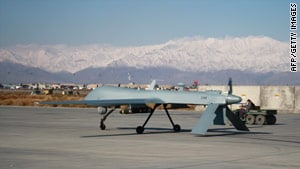My original plan for today’s post was to be on how the US may be over-relying on drone attacks against the Taliban and Al Qaeda, but then I read this Michael Phillips’ piece. But first the drones.
The drone attacks have indeed proved effective in eliminating several high level Taliban and Al Qaeda leaders. These men, with the latest possibly being Pakistani Taliban leader Hakimullah Mehsud, are dangerous, irreconcilable enemies who we all are left better on without. The Obama administration is obviously a big supporter of use of the drones in Pakistan and Afghanistan. It has been widely reported that the Obama administration has probably at least doubled (getting accurate numbers on what is a ‘secret’ process is difficult) the number of unmanned drone attacks since 2008. One report states that there have been around 30 drone missile attacks killing over 200 people since last September. The Obama administration’s just released budget contains a 75% increase in drone funding, which JCS Chairman Mike Mullen asserts will nearly double the number of Reaper and Predator orbits. Obama himself bragged about their increasing use, compared to 2008 (hint, I use them of more than Bush did).

As much as I’ve been a supporter of this method, I’m starting to be a bit concerned that the US may be becoming too reliant on what is despite its technologically impressive nature, a blunt instrument of war. Just the other day, it is believed 4 separate, but obviously connected drone strikes occurred in North Waziristan, reportedly killing 29 people. While I hope and am fairly certain, most of these victims were Al Qaeda or Taliban insurgent leaders, this one attack had to have had some costs as well. It is likely that some of those killed were civilians, which of course breeds anger and resentment from the local population. News of a large scale attack like this also is likely to pour even more fire in a country that is already growing tired of American interference. Lastly, even me, one who believes that the Taliban and Al Qaeda can’t just keep replacing dead/captured leaders, is starting to grow a bit skeptical on exactly how far back these assassinations are negatively impacting our adversaries in Central Asia. Hakimullah Mehsud just recently took the place of Baitullah Mehsud, and even if Hakimullah is infact a ‘goner’, how much will this set back the Taliban’s ability to create chaos in Pakistan and hold control over vast parts of Afghanistan? This question is extremely difficult to answer, but very important.
I also couldn’t help but connect Obama’s drone attack emphasis with his administration’s interrogation and Gitmo policies. To be blunt, it started to appear to me that this administration would rather just kill these perpetrators than have to deal with the mess of capturing, interrogating, prosecuting, and finally confining them. Back to the Phillips’ piece now….finally!
This amazing work of journalism showcases a much more nuanced, yet aggressive tactical strategy against the Taliban and Al Qaeda in Afghanistan. Phillips was embedded with a group of Special Forces, accompanied with Afghan Army personnel, in Afghanistan’s Zabul Province. He provides in-depth detail on how the US troops and Afghan army members attempt to find specific insurgent leaders by both getting close to local population (Barghantu village in this case) and aggressively combating the enemy with force if necessary. The piece ends with American medics desperately fighting to keep a professed Taliban fighter alive (using donated blood from US soldiers) just hours after their countrymen put the bullets in him. Though it wasn’t exactly said in the article (besides the usual COIN/protect the population lines from Petraeus and McChrystal early on), it was known that this special ops team wanted to learn more about the enemy, not just ‘kill’em off’. Combine this with the announced assault on Marjah in Helmand Province by top US/NATO military brass and one cannot just label the Obama administration’s Afghan strategy as too one-sided or parochial.
I hoped this made at least a little bit of sense.
(Photo Source: CNN)